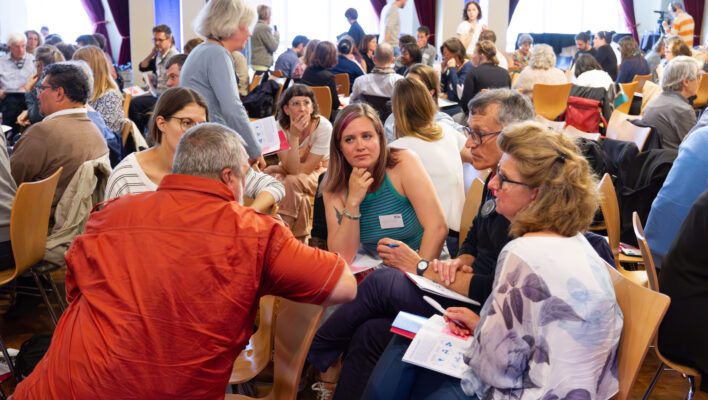Exchanging Ideas with People who Live in Poverty — in Collaboration with Migros Culture Percentage

![]() Reading time 3 minutes
Reading time 3 minutes
This article was originally published on the ATD Fourth World Switzerland site: Dialoguer avec des personnes vivant en situation de pauvreté
ATD Fourth World Switzerland and Migros Culture Percentage have come together to deliver a joint project, aiming to provide people who are interested in gaining a new perspective on poverty in Switzerland the opportunity to meet those affected by it.
In ATD Fourth World Switzerland’s 2019 to 2023 ‘Poverty-Identity-Society’ research project, people with experience of poverty, professionals, and academics came together as co-researchers to develop a deeper understanding of poverty in Switzerland. The project culminated in a research document entitled ‘Institutions, Society, and People Living in Poverty in Switzerland; A Continuing Experience of Violence’. It illustrated the need to facilitate constructive dialogue between people with lived experience of poverty and those without in order to improve society’s awareness of poverty-related issues.
The research document was shared at a conference in May 2023, entitled ‘Poverty — And Endless Cycle: What is the responsibility of our society?’. Migros Culture Percentage provided financial support for the conference, and their senior management team were sent the research document. It sparked their interest, and they subsequently contacted ATD Fourth World Switzerland to discuss the possibility of a collaborative partnership revolving around the proposals for change identified in the report.
It was immediately apparent that Migros Culture Percentage and ATD Fourth World were united by shared values. As a result, the manager at Migros Culture Percentage visited ATD Fourth World Switzerland’s National Centre in Treyvaux where, together with ATD Fourth World activists and allies, key topics were discussed with the aim of organising a joint project.
Migros Culture Percentage outlines the project on its website: “In a joint project, Migros Culture Percentage and ATD Fourth World Switzerland are enabling anyone interested to develop a new perspective on poverty in Switzerland by meeting people living in poverty. […] Would you like to join others and tackle poverty? Are you interested in the challenges and prejudices confronted by people who live in poverty? Would you like to get involved and take tangible action against social exclusion?”.
The joint project, entitled ‘In dialogue with people with experience of poverty’, is a ‘ discussion initiative’ comprising several activities. At its core are a series of events that will take place in several locations across Switzerland. Some of those participating might not have otherwise had the opportunity to take part in these kind of conversations as a result of their different social contexts. These individuals will reflect and work together to develop action strategies and key objectives which will help everyone take appropriate action when it comes to poverty in our society (for example, when organising a discussion between colleagues or an open forum). During these events, particular attention will be granted to local issues, such as a vote on a district law concerning social security, a political party’s questionable poster, or a derogatory article in the local press.
The interactions brought about by these events will hopefully be a rich source of ideas and differing perspectives. We will then publish a document during the second phase of the project, provisionally entitled ‘Putting an end to prejudice towards poverty and those experiencing it’. While this will be a written publication, it will also include other mediums of expression (such as caricatures and cartoons). It will be aimed at a wide target audience and, where possible, focus on daily life.
During the third phase, set for 2027, we aim to organise a series of street activities in various locations across Switzerland involving the people who took part in the first phase of the project. It is our hope that, following the conversations of the first phase, people will feel an even greater sense of commitment to overcoming poverty and independently encourage those around them to take action.

